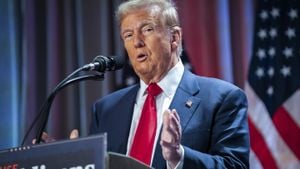On January 18, 2024, former President Donald Trump and First Lady Melania Trump launched two meme coins, $TRUMP and $MELANIA, generating both excitement and controversy within the cryptocurrency market. Initially, these tokens surged dramatically, with the $TRUMP coin reaching as high as $75 by January 19, before experiencing a sharp decline to just under $38 by January 21. This drastic fluctuation has left many crypto investors pondering the true value and future of meme coins associated with the Trump family.
The launch was met with immediate attention on social media, as Trump publicly declared the coins to celebrate their base and influence. "Our beliefs deserve to be rewarded!" Trump proclaimed, but the ramifications of such speculative ventures have raised questions among market experts about the integrity of cryptocurrencies. Analysts pointed to the financial structure of the tokens, which lacked substantial backing beyond their playful branding and had been criticized for being primarily profit-driven without tangible utility.
Following the launch of the $MELANIA coin less than 48 hours later, $TRUMP's price plummeted, with some traders positing there was direct competition for investor funds between the two tokens. This overlap led to rapid sell-offs as investors attempted to buy both, compounding the volatility of the market. Many crypto enthusiasts and seasoned investors questioned whether these rapidly introduced tokens were merely gimmicks, and if perhaps they were reflective of broader issues within the crypto industry itself.
Experts have begun to weigh the ethical concerns tied to the coins. Azeem Khan, co-founder of blockchain development firm Morph, stated, "Meme coins are definitely PvP games. Someone has to lose for someone else to win." This sentiment echoed through the market as many speculated about the potential for serious losses among Trump supporters who invested heavily, driven by loyalty rather than sound financial judgment.
The coin's meteoric rise and fall inevitably attracted political scrutiny. Senator Elizabeth Warren boldly condemned the action on CNN, claiming, "This is transparent corruption," urging the broader community to look critically at the motivations behind the launch. The sentiment echoed within the cryptocurrency community, where 75% of surveyed respondents expressed concerns over the market's integrity as dressed up by tokens linked to political figures.
Even among Trump’s supporters, unease has crept in. Former Messari CEO Ryan Selkis articulated frustration on social media, saying the second coin's launch was detrimental to the president's image and financial interests, adding, "They don’t have your interests in mind" when referring to the advisement team behind the token. Selkis urged Trump to reconsider the counsel structuring such initiatives as they contradict the values held dear by many within his political base.
Quinn Thompson, the founder of Lekker Capital, described the situation as "a glaringly obvious top signal" suggestive of market volatility tempered by speculative enthusiasm—an alarming sign for investors who have positioned themselves against perceived bubbles within the cryptocurrency space.
Despite the skepticism surrounding the meme coin's integrity, the Trump family's foray has captivated new investors, with around 42% of the participants reportedly entering the cryptocurrency market for the first time following the coin's introduction. This development indicates how the allure of high-profile endorsements can lead to increased interest and participation, though the consequences may not always favor those involved.
The question of whether the Trump family’s coins are truly advantageous for the cryptocurrency industry's future remains. While there are enthusiastic believers touting the coins as vehicles for wealth, many, including crypto veterans, view them as potential catalysts for disaster. The community grapples with balancing legitimacy with speculative enthusiasm, as buoyed by the celebrity of its promoters.
Nevertheless, industry leaders expect this push may prompt the regulatory atmosphere to shift favorably for cryptocurrency, especially as Trump himself expressed intentions of targeting legislation helpful to digital assets. Yet, for many, this goodwill may seem overshadowed by questions about the tokens' efficacy and the Trump family's underlying motivations.
An intriguing aspect remains, particularly about the risk of these meme tokens acting as tools for campaign financing rather than genuine financial instruments. Recent revelations suggest concerns about how these assets could be utilized as informal channels of fundraising impacting the political sphere unnoticed.
The Trump family's engagement with cryptocurrencies serves as both a spectacle and representation of the widespread desire for inclusive financial opportunities—even as it risks undermining the serious intentions of what crypto can offer within the economy. The public's mixed reception to the $TRUMP and $MELANIA coins lays bare the complexity of cryptocurrency as simultaneously revolutionary and reckless.



